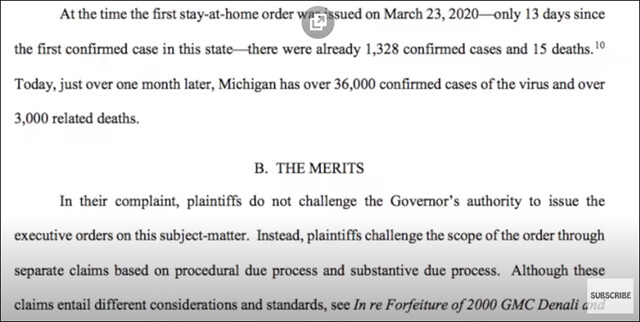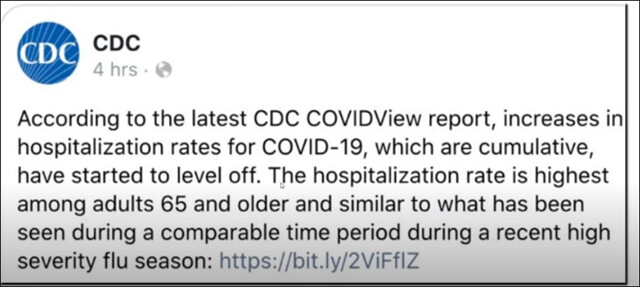Similar court cases have come out in Florida and Kentucky. There are probably more. Those are just the ones I know about. Also, Mayors and Sheriffs throughout the country, including Tennessee, are refusing to comply with the unlawful "orders". There was even a school district in California that stayed open! Don't be a sheep. Refuse to comply with unconstitutional mandates. It is your right as a citizen and a human being. (If you are sick, stay home to the maximum extent possible. That is your obligation as a human being, regardless of what the "law" says.)
Michigan Governor Whitmer’s sweeping Executive Order were just declared constitutional. Here's a breakdown of the court order dismissing the preliminary injunction seeking.
A lawsuit against the coronavirus home confinement and banned freedom of association rules in Michigan has yielded an interim ruling, and it doesn't look good.We can see here the veil being lifted as to what rights we actually thought we have, as interpreted through the eyes of the courts, like all in theory but none at all in practice (from the court decision on a TRO, page 7 et.seq.):
"In other words, the constitutional right asserted does not make a difference when considering this issue, because both are subject to a balancing with the state’s interest to protect the public health. This holds true because, and perhaps contrary to common knowledge, most, if not all, individual constitutional rights are not absolute and are subject to a balancing with the countervailing state interest. See New Rider v Board of Ed of Independent School Dist No 1, 480 F2d 693, 696 (CA 10, 1973) (“Constitutional rights, including First Amendment rights, are not absolutes.”) and In re Abbott , 954 F3d 772, 784 (CA 5, 2020) (Recognizing, when addressing Texas emergency rules during the coronavirus pandemic, that individual rights secured by the Constitution could be reasonably restricted during a health crisis)""Though our individual constitutional rights cannot be suspended or eliminated, they are, as noted,subject to reasonable regulation by the state. And, when it comes to the power of the state to act in the best interests of the public health when faced with a serious contagious disease, which is the state interest acted upon by the Governor""In addressing this argument, it is imperative to recognize the limited question the Court'is empowered to decide. Except in limited circumstances mentioned later, it is not for the courts to pass on the wisdom of state action that is granted to it by the general police power or by statute..Certainly the state cannot simply ignore the individual rights enshrined in our federal (or state)constitution in the name of a public health threat. Judicial review of state actions is therefore (and quite obviously) appropriate and necessary. But the depth of that review is limited, and does not include delving deep into the pros and cons of what is the better plan of action between two reasonable alternatives.""Binding authority from the United States Supreme Court and the Michigan Supreme Court compels this Court to conclude that plaintiffs do not have a substantial likelihood of success on the merits. This is not because the rights asserted by plaintiffs are not fundamental—being forced(with some important exceptions) by the state to remain in one’s home, in turn causing many residents to be unable to work, visit elderly relatives, and to generally move about the state. But those liberty interests are, and always have been, subject to society’s interests—society being our fellow residents. They—our fellow residents—have an interest to remain unharmed by a highly communicable and deadly virus, and since the state entered the Union in 1837, it has had the broad power to act for the public health of the entire state when faced with a public crisis."
https://youtu.be/HO07dnw7Ung?t=474
Gary T




